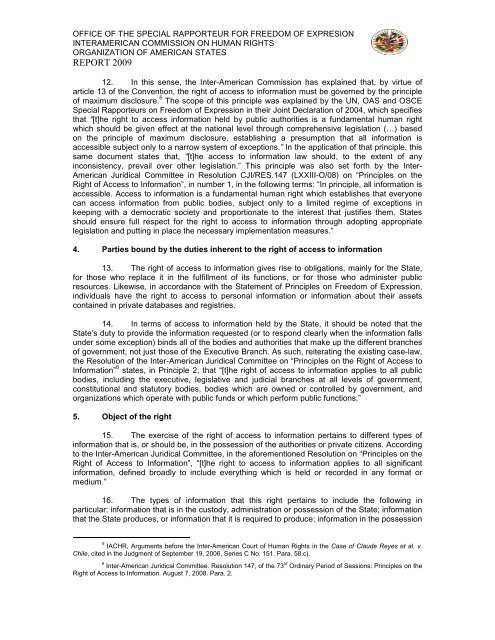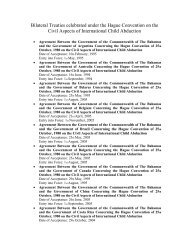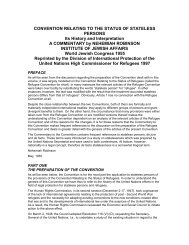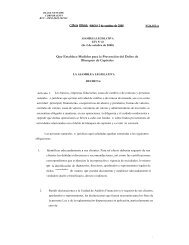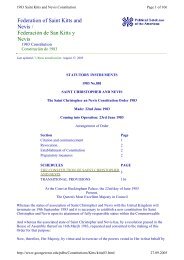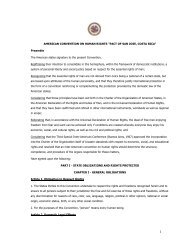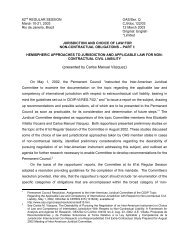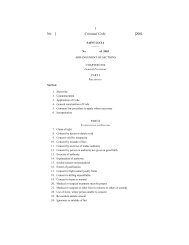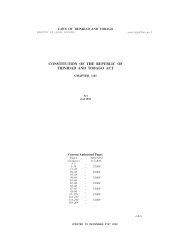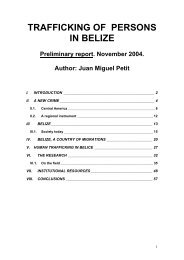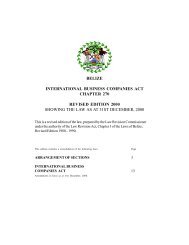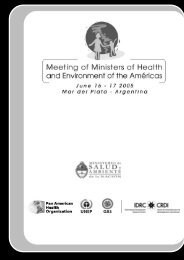The right of access to information Special Rapporteurship for ... - OAS
The right of access to information Special Rapporteurship for ... - OAS
The right of access to information Special Rapporteurship for ... - OAS
You also want an ePaper? Increase the reach of your titles
YUMPU automatically turns print PDFs into web optimized ePapers that Google loves.
OFFICE OF THE SPECIAL RAPPORTEUR FOR FREEDOM OF EXPRESION<br />
INTERAMERICAN COMMISSION ON HUMAN RIGHTS<br />
ORGANIZATION OF AMERICAN STATES<br />
REPORT 2009<br />
12. In this sense, the Inter-American Commission has explained that, by virtue <strong>of</strong><br />
article 13 <strong>of</strong> the Convention, the <strong>right</strong> <strong>of</strong> <strong>access</strong> <strong>to</strong> <strong>in<strong>for</strong>mation</strong> must be governed by the principle<br />
<strong>of</strong> maximum disclosure. 5 <strong>The</strong> scope <strong>of</strong> this principle was explained by the UN, <strong>OAS</strong> and OSCE<br />
<strong>Special</strong> Rapporteurs on Freedom <strong>of</strong> Expression in their Joint Declaration <strong>of</strong> 2004, which specifies<br />
that “[t]he <strong>right</strong> <strong>to</strong> <strong>access</strong> <strong>in<strong>for</strong>mation</strong> held by public authorities is a fundamental human <strong>right</strong><br />
which should be given effect at the national level through comprehensive legislation (…) based<br />
on the principle <strong>of</strong> maximum disclosure, establishing a presumption that all <strong>in<strong>for</strong>mation</strong> is<br />
<strong>access</strong>ible subject only <strong>to</strong> a narrow system <strong>of</strong> exceptions.” In the application <strong>of</strong> that principle, this<br />
same document states that, “[t]he <strong>access</strong> <strong>to</strong> <strong>in<strong>for</strong>mation</strong> law should, <strong>to</strong> the extent <strong>of</strong> any<br />
inconsistency, prevail over other legislation.” This principle was also set <strong>for</strong>th by the Inter-<br />
American Juridical Committee in Resolution CJI/RES.147 (LXXIII-O/08) on “Principles on the<br />
Right <strong>of</strong> Access <strong>to</strong> In<strong>for</strong>mation”, in number 1, in the following terms: “In principle, all <strong>in<strong>for</strong>mation</strong> is<br />
<strong>access</strong>ible. Access <strong>to</strong> <strong>in<strong>for</strong>mation</strong> is a fundamental human <strong>right</strong> which establishes that everyone<br />
can <strong>access</strong> <strong>in<strong>for</strong>mation</strong> from public bodies, subject only <strong>to</strong> a limited regime <strong>of</strong> exceptions in<br />
keeping with a democratic society and proportionate <strong>to</strong> the interest that justifies them. States<br />
should ensure full respect <strong>for</strong> the <strong>right</strong> <strong>to</strong> <strong>access</strong> <strong>to</strong> <strong>in<strong>for</strong>mation</strong> through adopting appropriate<br />
legislation and putting in place the necessary implementation measures.”<br />
4. Parties bound by the duties inherent <strong>to</strong> the <strong>right</strong> <strong>of</strong> <strong>access</strong> <strong>to</strong> <strong>in<strong>for</strong>mation</strong><br />
13. <strong>The</strong> <strong>right</strong> <strong>of</strong> <strong>access</strong> <strong>to</strong> <strong>in<strong>for</strong>mation</strong> gives rise <strong>to</strong> obligations, mainly <strong>for</strong> the State,<br />
<strong>for</strong> those who replace it in the fulfillment <strong>of</strong> its functions, or <strong>for</strong> those who administer public<br />
resources. Likewise, in accordance with the Statement <strong>of</strong> Principles on Freedom <strong>of</strong> Expression,<br />
individuals have the <strong>right</strong> <strong>to</strong> <strong>access</strong> <strong>to</strong> personal <strong>in<strong>for</strong>mation</strong> or <strong>in<strong>for</strong>mation</strong> about their assets<br />
contained in private databases and registries.<br />
14. In terms <strong>of</strong> <strong>access</strong> <strong>to</strong> <strong>in<strong>for</strong>mation</strong> held by the State, it should be noted that the<br />
State’s duty <strong>to</strong> provide the <strong>in<strong>for</strong>mation</strong> requested (or <strong>to</strong> respond clearly when the <strong>in<strong>for</strong>mation</strong> falls<br />
under some exception) binds all <strong>of</strong> the bodies and authorities that make up the different branches<br />
<strong>of</strong> government, not just those <strong>of</strong> the Executive Branch. As such, reiterating the existing case-law,<br />
the Resolution <strong>of</strong> the Inter-American Juridical Committee on “Principles on the Right <strong>of</strong> Access <strong>to</strong><br />
In<strong>for</strong>mation” 6 states, in Principle 2, that “[t]he <strong>right</strong> <strong>of</strong> <strong>access</strong> <strong>to</strong> <strong>in<strong>for</strong>mation</strong> applies <strong>to</strong> all public<br />
bodies, including the executive, legislative and judicial branches at all levels <strong>of</strong> government,<br />
constitutional and statu<strong>to</strong>ry bodies, bodies which are owned or controlled by government, and<br />
organizations which operate with public funds or which per<strong>for</strong>m public functions.”<br />
5. Object <strong>of</strong> the <strong>right</strong><br />
15. <strong>The</strong> exercise <strong>of</strong> the <strong>right</strong> <strong>of</strong> <strong>access</strong> <strong>to</strong> <strong>in<strong>for</strong>mation</strong> pertains <strong>to</strong> different types <strong>of</strong><br />
<strong>in<strong>for</strong>mation</strong> that is, or should be, in the possession <strong>of</strong> the authorities or private citizens. According<br />
<strong>to</strong> the Inter-American Juridical Committee, in the a<strong>for</strong>ementioned Resolution on “Principles on the<br />
Right <strong>of</strong> Access <strong>to</strong> In<strong>for</strong>mation”, “[t]he <strong>right</strong> <strong>to</strong> <strong>access</strong> <strong>to</strong> <strong>in<strong>for</strong>mation</strong> applies <strong>to</strong> all significant<br />
<strong>in<strong>for</strong>mation</strong>, defined broadly <strong>to</strong> include everything which is held or recorded in any <strong>for</strong>mat or<br />
medium.”<br />
16. <strong>The</strong> types <strong>of</strong> <strong>in<strong>for</strong>mation</strong> that this <strong>right</strong> pertains <strong>to</strong> include the following in<br />
particular: <strong>in<strong>for</strong>mation</strong> that is in the cus<strong>to</strong>dy, administration or possession <strong>of</strong> the State; <strong>in<strong>for</strong>mation</strong><br />
that the State produces, or <strong>in<strong>for</strong>mation</strong> that it is required <strong>to</strong> produce; <strong>in<strong>for</strong>mation</strong> in the possession<br />
5 IACHR, Arguments be<strong>for</strong>e the Inter-American Court <strong>of</strong> Human Rights in the Case <strong>of</strong> Claude Reyes et al. v.<br />
Chile, cited in the Judgment <strong>of</strong> September 19, 2006, Series C No. 151. Para. 58.c).<br />
6 Inter-American Juridical Committee. Resolution 147, <strong>of</strong> the 73 rd Ordinary Period <strong>of</strong> Sessions: Principles on the<br />
Right <strong>of</strong> Access <strong>to</strong> In<strong>for</strong>mation. August 7, 2008. Para. 2.


